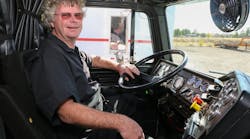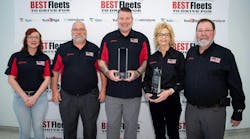It's difficult to decide what's more impressive about trucker Finn Murphy – that he's figured out how to make five to seven times more than the average truck driver or that he's just published a book with a major book company about his driving career and received laudatory attention ranging from the New York Times to the literary magazine Paris Review.
The Long Haul: A Trucker's Tales of Life on the Road (W. W. Norton & Company; June 2017) is a trucking memoir that goes beyond the interstates. Bedbugger Murphy describes his life, the job, and about where this country is heading. He eschews the low-rent stereotype of truckers that many Americans hold to, yet he clings to the outsider image, the man/machine combo that hurdles through the landscapes on its own terms in pursuit of a buck.
Murphy is not just a mover but an 'executive' mover who can earn north of $200,000 a year by not being a jerk, and understanding that he's not just moving stuff, he's moving lives. One of the secrets of his success is that he knows how to talk to the one-percenters by appearing professional, personable and confident while jollying them along. He runs each job from start to finish in his own way, hires the best helpers and wears a clean logoed shirt.
"The customers I move are more difficult people to move, not less so. The easiest people to move household goods are other working people. The hardest people are those who treat movers as if they’re some kind of monkeys, just there to get their stuff out of the way. My customers are looking for continuity, and they want their expectations met. Some of these moves are $50,000, $60,000, $70,000 jobs," he says.
Murphy first got his CDL in 1980. "Before that, I was a local mover since 1976. I drove the North American Van Lines for about 10 years. Then I took 20 years off, and I’ve been driving for Joyce Van Lines out of Oxford, Connecticut for the last nine years. I’m a contractor, a lease driver." During his two-decade hiatus from trucking, he lived in Nantucket, Massachusetts selling clothing. He then divorced and moved to Colorado.
That's when he worked his way into the high-end moving business.
He's been writing the book since 1984. "At the end of each day, I had a little audiocassette recorder, and I’d dictate some impressions. They began to accumulate, and I had many of these, spanning decades. I had them transcribed and thought, 'Well, this looks kind of interesting. Maybe I could turn this into a book.' That's the genesis of it. The response has been unbelievable. I’m pinching myself. I got everything. I got an advance, I got a full-time editor, I got a national book tour and they’re pushing the book really hard; it’s like a Cinderella story. It’s not ready yet, but we’re wrapping a trailer with the book cover."
Murphy often sets himself apart from other truckers. His rig is named Cassidy, "a good-looking, dependable GMC Astro 95 with a Cummins 290 diesel engine," he writes. "She's considered a total piece of crap by the freight-hauler fraternity. They all want the long-nosed Peterbilts. Another disconnect between movers and freight haulers is that movers don't care what power plant we drive so long as we're making money. The freight haulers are the total opposite. This is totally ludicrous, because it's not like they own what they drive… 'Watcha drivin'? is a standard first question at truckstop coffee counters. 'Got a bank account?' is my first question.
In promoting his book, Murphy has done more than 40 radio interviews from local AM stations to National Public Radio and everything in between. And he's done a bunch of call-in shows. "Most of the call-ins have been drivers, and they’ve been pretty positive. They appreciate that I make it clear in the book that drivers are a diverse crowd. It’s not just a group of crazy Southern rednecks. There’s everybody. They appreciate that I point out that making any blanket judgment about two million drivers is probably inaccurate."
And the general public? "The most common questions is 'what do drivers think about car drivers?' In general, I think Americans are courteous and good drivers. If they would confine their activities to driving, rather than driving and doing something else, things would be better. I see everything that happens in cars. People are eating, they’re spilling their coffee, they’re putting on makeup, they’re texting. It appears to me that the single-most common activity that car drivers are engaged in is working on their relationship with the person in the passenger seat. You can see that from the body language. You see it from the way their arms move. Most of these relationships apparently have some sort of conflict involved. Every once in a while you see a romantic relationship that doesn’t involve conflict. That’s always interesting and fun to see, but it’s not good driving."
His continental crisscrossing gives rise to pontificating about the state of the country. "As far as I can figure," he writes, "the only places left in America that can boast of vibrant downtowns are college towns and high-end tourist towns. In the rest of the country, the downtowns were hollowed out when nobody was looking."
He has plenty of time to think about his customers and their possessions, too. "Movers are there at the beginning point of accumulation and all the points to the bitter end, so we tend to develop a Buddhist view of attachment. We do not covet your stuff. It's freight. We'll take the best care we can because you're paying for that, and we're responsible for the damage," he writes. "But we don’t care on any other so-called higher level because no higher level exists. Sentimental value of stuff is a mug's game. The only beneficiary is the self-storage guy."
As for the state of the industry, Murphy says: "One thing's always confused me about driver retention: supply and demand. If there’s demand for drivers, and there’s not enough of them, then you’d think the pay would go up. But the pay has not gone up since the early 1980s with deregulation. In fact, it's stayed down since then. If you’re a freight hauler for a carrier you’re making maybe thirty-five grand a year, and in dollar terms that’s less than it was in the '80s. Just from basic economics, it doesn’t seem like there’s a driver shortage because the pay hasn’t gone up. That’s number one. Number two, again, for the big freight hauling companies, the turnover is running eighty-five or ninety percent a year yet there seems to be an inexhaustible supply of new drivers coming in who probably have been downsized from some middle class industrial job somewhere else. It looks like a lot of these companies take drivers, chew ‘em up, spit ‘em out, and get ready for the new crowd."
Getting into the rarefied world of executive moving isn't for everyone, but Murphy has advice for truckers who want to earn more. "You need to bring another skill into the industry other than driving. If you know how to tarp, if you know how to move furniture and move families, if you have specialized equipment like a tanker, or you're a car hauler… with these kind of skills you’ll make a lot more money. But you have to know what you’re doing. I move corporate big shots and their families. I need diplomacy, I need tact, I need to have my own crews, I need to move their stuff without breaking it, and I need to keep them all on an even keel through a life transition. That’s what I’m paid for. I’m not really paid to be a driver. I’m paid to make a move work properly. I try to understand that they’re going through a major life transition, and it’s emotionally fraught and distressing for them. If I can remember that, and not bring my own problems into the move and just concentrate on servicing the customers through their transition, then I’m going to have a satisfied customer. The reason that it’s lucrative for me is because I control the move from the very beginning to the very end. We pack the cartons, we clean the dishes, we even make the beds at the other end. We’re doing full-service moves."
He concludes the book by drifting off in his cab where he always sleeps better than anywhere else. "A mover's job is to shift people from where they are to where they're supposed to be. Lucky for me, every once in a while I find the place where I'm supposed to be. It's a priceless gift that I only get while I'm on the road. It's the best job in the world."



